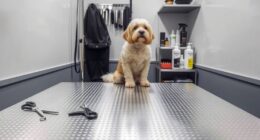Many new cleaning business owners struggle with setting the right prices, training staff effectively, and developing clear policies, which can hurt growth and client satisfaction. They often underprice services or overcharge without understanding the market, and overlook the importance of well-trained employees who deliver consistent quality. Additionally, ignoring cultural factors and market trends can limit your reach. Stay ahead by avoiding these common pitfalls, and you’ll discover key strategies for lasting success.
Key Takeaways
- Setting inappropriate prices without market research can harm profitability or deter clients.
- Insufficient employee training leads to inconsistent service and customer dissatisfaction.
- Lack of clear policies causes confusion and inconsistent performance among staff.
- Misalignment between pricing and employee understanding hampers effective communication and value delivery.
- Ignoring market and cultural factors limits marketing effectiveness and customer engagement.

Starting a cleaning business can be rewarding, but new owners often make avoidable mistakes that hinder growth and success. One of the most common errors is not establishing effective pricing strategies from the start. You might be tempted to underprice your services to attract customers, but this can hurt your profitability and undervalue your work. Conversely, setting prices too high without understanding the market can scare away potential clients. To strike the right balance, research what competitors are charging and consider your costs carefully. Remember, your pricing should reflect the quality of your service, your experience, and the value you bring. Regularly reviewing and adjusting your prices ensures you stay competitive while maintaining healthy margins.
Another critical mistake is neglecting employee training. Your staff can make or break your reputation, so investing in proper training is essential. When employees aren’t adequately trained, they may perform cleaning tasks inefficiently or inconsistently, leading to unhappy clients and bad reviews. Proper employee training covers not just cleaning techniques but also customer service, safety protocols, and the use of equipment. When your team knows exactly what to do and how to do it well, it boosts their confidence and productivity. Training also demonstrates that you value your employees, which can reduce turnover and foster a more committed workforce. Well-trained staff will deliver consistent quality, which helps build trust with clients and encourages repeat business.
Failing to develop clear policies around employee performance and customer interactions can also cause issues. Make sure your team understands your standards and expectations from day one. Provide ongoing training sessions and feedback, so your employees stay aligned with your business goals. When your staff is confident and well-versed in their responsibilities, you’ll see fewer mistakes and higher customer satisfaction.
Finally, don’t overlook the importance of integrating your pricing strategies with employee training. When your team understands the value behind your pricing—such as the quality of service and professionalism—you can better communicate with clients and justify your rates. This alignment ensures everyone is working towards the same goal: providing excellent service at a fair price. Additionally, staying informed about astrological influences and cultural beliefs can help tailor your marketing to specific customer preferences, boosting your business’s appeal.
In essence, avoiding these mistakes requires a proactive approach. Develop thoughtful pricing strategies based on market research and costs, and prioritize thorough employee training. These foundational steps set your cleaning business up for long-term success, helping you grow sustainably while maintaining a stellar reputation.
Frequently Asked Questions
How Can I Effectively Price My Cleaning Services?
To price your cleaning services effectively, start by researching local competitors and using pricing strategies that reflect your quality and experience. Create clear service packages that cater to different customer needs, offering options for basic and premium services. Consider your costs and desired profit margins, then set competitive but fair prices. Regularly review your pricing to stay aligned with market changes and guarantee you’re maximizing your revenue.
What Licensing and Permits Are Required to Start?
To start your cleaning business, you need to make certain legal compliance by obtaining the necessary licenses and permits. You should check local, state, and federal regulations to identify the specific permits required, such as a business license, LLC registration, or a cleaning-specific permit. Proper permit acquisition not only keeps you compliant but also builds trust with clients. Make sure to research thoroughly and stay updated on any licensing changes in your area.
How Do I Find Reliable Employees?
Imagine you’re building a sturdy bridge; you want reliable employees to support your path. To find them, start with thorough employee screening to identify dependable candidates. Conduct interviews that reveal their work ethic and check references. Once onboard, implement strong training standards to guarantee consistency. Trust your instincts, and take your time. Reliable employees will uphold your business reputation, helping your cleaning venture flourish confidently and smoothly.
What Marketing Strategies Are Most Successful?
You should focus on social media marketing to reach local clients and build your brand presence. Consistently posting before-and-after photos, customer testimonials, and special offers can attract new business. Additionally, implementing referral programs encourages satisfied clients to recommend your services to friends and family. These strategies are cost-effective, build trust, and generate steady leads, helping you grow your cleaning business steadily and sustainably.
How Can I Manage Cash Flow During Slow Periods?
When managing cash flow during slow periods, you focus on cash flow management and seasonal budgeting. You prioritize saving a portion of your income, cutting unnecessary expenses, and setting aside emergency funds. You also adjust your budgets based on seasonal demand, ensuring you’re prepared for lean times. By staying proactive, tracking expenses closely, and planning ahead, you maintain financial stability and keep your cleaning business thriving, even during slow seasons.
Conclusion
Starting a cleaning business is a fantastic journey, but even the best plans can stumble if you overlook some common pitfalls. By learning from others’ missteps, you’ll steer clear of potential hurdles and keep your business on a smooth path. Remember, every mistake is just a gentle nudge guiding you toward better strategies. Keep your focus, stay adaptable, and you’ll build a thriving, resilient cleaning business that stands the test of time.










